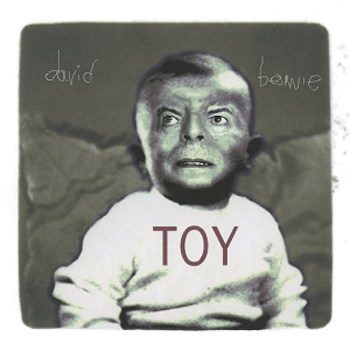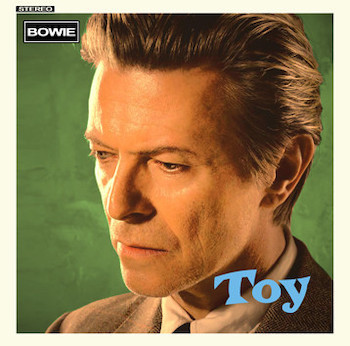Rock Album Review: David Bowie’s “Toy” — Perusing His Back Pages
By Matt Hanson
David Bowie’s Toy is a solid, enjoyable, and buoyant effort from an artist who never failed to stay interesting and vital well into his later years.
 By the year 2000, David Bowie was in the unexpected position of being a countercultural elder statesman. The Thin White Duke had lived long enough to glimpse the future his prescient songs had helped imagine. It would be close, though not quite right, to claim that he was the father of alternative music. Ever the self-deprecating Englishman, Bowie himself would probably have deferred to Lou Reed or Iggy Pop, both of whom were crucial artistic influences and personal friends. Fresh from a consummate performance in the Glastonbury Festival at the beginning of the new century, the perpetually shape-shifting Bowie had found a way to remain innovative and vibrant without returning to the occasionally psychotic excesses of his youth.
By the year 2000, David Bowie was in the unexpected position of being a countercultural elder statesman. The Thin White Duke had lived long enough to glimpse the future his prescient songs had helped imagine. It would be close, though not quite right, to claim that he was the father of alternative music. Ever the self-deprecating Englishman, Bowie himself would probably have deferred to Lou Reed or Iggy Pop, both of whom were crucial artistic influences and personal friends. Fresh from a consummate performance in the Glastonbury Festival at the beginning of the new century, the perpetually shape-shifting Bowie had found a way to remain innovative and vibrant without returning to the occasionally psychotic excesses of his youth.
Evidently Bowie was very much in the right space, personally and creatively, to start perusing his back pages. Bowie was a tireless worker with a sizable back catalogue of songs that he’d always been meaning to take another crack at. So he got a solid band behind him and knocked some of them out in one or two takes apiece live in the studio, spontaneous and open. The result was what is now the new box set Toy, which is in some ways a lost Bowie record. It can be purchased on its own as a three-disc set or as a part of a larger box chronicling the late ’90s era of his career.
Toy never ended up materializing as a proper record in its own time. But it should surprise no one that this has more to do with a distracted record company than with the value of these discs. Toy is a solid, enjoyable, and buoyant effort from an artist who never failed to stay interesting and vital well into his later years. It opens with the pleasant but fairly vapid “I Dig Everything,” which makes what might be an engaging premise for a song — really? You dig everything? — insipid. “I wave to the police and they don’t wave back/ They don’t dig everything.” Apparently not. And neither, it must be said, do we. I enjoyed the ebullient “Karma Man” much more, with its graceful chorus of “slow down.” Usually good advice. I particularly dug the rave-ups of “Can’t Help Thinking About Me” and “Baby Loves That Way” which has a rollicking, sing-along chorus about a capricious lover that would have made it an ideal first single had the record been released at the turn of the century, when Bowie intended.
 Toy’s three-volume format, with two separate discs offering different versions from the first record, at first smacks of the gratuitous. But the multiple volume structure ends up working to its benefit. Toy finds its own level. Usually the bonus material doesn’t add much to box sets, aside from satisfying the appetite of the most anal-retentive, snobby fans, who simply must hear everything available, the more obscure the better. A song that is “remixed” or “alternative” should be about more than novelty. After giving each of Toy’s three versions a few spins, it becomes clear that the second and third discs — labeled as an “Alternative” mix and an “Unplugged and Somewhat Slightly Electric” respectively — bring out a poignancy and stateliness that’s somewhat lacking in the first disc. They also add in a few new versions of older titles just for kicks.
Toy’s three-volume format, with two separate discs offering different versions from the first record, at first smacks of the gratuitous. But the multiple volume structure ends up working to its benefit. Toy finds its own level. Usually the bonus material doesn’t add much to box sets, aside from satisfying the appetite of the most anal-retentive, snobby fans, who simply must hear everything available, the more obscure the better. A song that is “remixed” or “alternative” should be about more than novelty. After giving each of Toy’s three versions a few spins, it becomes clear that the second and third discs — labeled as an “Alternative” mix and an “Unplugged and Somewhat Slightly Electric” respectively — bring out a poignancy and stateliness that’s somewhat lacking in the first disc. They also add in a few new versions of older titles just for kicks.
“Liza Jane” opens the second disc and dates back to one of the first songs Bowie ever worked on, back when he was tinkering around with blues standards in pubs as a member of the King Bees, clad in mop-tops and matching shirts. “In the Heat of the Morning” first appeared as part of the ’70s era BBC sessions with John Peel, and this version sands a bit off of the edge in the spikier earlier version. The largely acoustic format of the third disc makes the acrobatic vocal workout of “Silly Boy Blue” really impressive, since Bowie’s operatic voice (always his secret weapon) isn’t overshadowed by the backing band. The minimalist approach also gives “Shadow Man,” a slightly ominous ode to the hidden self, a greater depth.
Bowie was a voracious consumer of all kinds of musical and nonmusical culture, and was widely and deeply read. Some of the songs that appear multiple times on Toy are attempts at nuanced character studies, something of a short story in song. “The London Boys” is a tale of a naive lad quickly getting in over his head with some grungy street people. The portrait comes across more sympathetically when performed acoustically. “Conversation Piece” is a first-person account of a Prufrock-like writer (“I’m a thinker, not a talker/ and I’ve no one to talk to anyway/ I can’t see the road for the rain in my eyes”) whose awareness of his own debilitating isolation comes too late. It’s not the kind of character you might expect from the previously gleefully outrageous Bowie, but maybe that’s what the rub of time does to a fellow.
We are lucky that an artist as gifted, generous, and encouragingly sui generis as Bowie produced music of consistent quality for so long. Not all of it is as unwaveringly brilliant as his stellar ’70s era run — but that’s no slag. It’s the rare artist (in any field) who can sustain that level of intensity. Toy is a solid and accessible lost artifact of an often-overlooked period in Bowie’s career. And it is worth hearing for that reason alone. If anything, one comes away from this three-disc set with a refreshing sense of the flexibility of a legend who could revisit his old material and make it new, having plenty of fun while he’s at it. What more could we ask for?
Matt Hanson is a contributing editor at the Arts Fuse whose work has also appeared in American Interest, Baffler, Guardian, Millions, New Yorker, Smart Set, and elsewhere. A longtime resident of Boston, he now lives in New Orleans.
